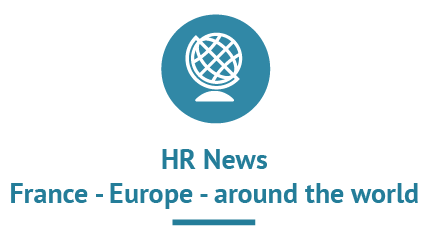|
If you are having trouble viewing this email, please
download the PDF version
or contact us.
|
 |
| #04 - April 2018 |
| PDF version - Manage your subscription - Search - Archives |

|
|
vision RH is a newsletter published by the French Directorate General for Administration and the Civil Service (DGAFP).
It draws on information sources and reports issued by public administrations, the private sector, international organisations and the press, in several different languages. It aims to provide a broad view of current human resources and civil service initiatives. |
|

|

|
| Management innovation at the heart of the transformation of Denmark’s public sector | |||||
|
Innovating in order to improve public services, while also assisting public sector employees in facing the changes under way in their duties – this is a long-term priority for Denmark. For nearly 20 years now, the country has been modernising its administration, encouraging any initiative that can contribute to the “State of Tomorrow” (morgendagens Staten). Many innovative proposals have been made, with two flagship initiatives: the Centre for Public Innovation (COI) and MindLab. In its National Reform Programme for 2014-2020, the Danish government emphasised the transformation of its public sector. The aim was to assert the political determination to support high-performance schemes by incorporating them into strategy that would foster synergies. A Ministry for Public Sector Innovation was created in November 2016. Sophie Løhde, the current minister, heads up a new government department comprising four national agencies, with total headcount of 1,000: Modernisation, Digitisation, Governmental IT Services and Personnel. Grouping together all the stakeholders of public sector transformation and ensuring that human resources holds its rightful place is an innovative approach. With this last step, Denmark has placed the civil service and the full set of HR processes at the heart of public sector transformation. Interactions between the three levels of administration in Denmark (central, regional and municipal governments) are highly encouraged. In 2017, 131 public sector managers took part in an initial immersion programme to develop new networks and share best practices. One noteworthy example of this kind of cooperation in management is the Code for Chief Executive Excellence. A result of collaborative efforts involving two researchers, this code aims to give management the keys for success in an administrative world that is constantly changing. More than a set of principles and values, this code is a document designed as a self-evaluation mechanism. The manager is asked a series of questions about real-life situations related to each of the nine recommendations identified by the code’s authors. Initial feedback is provided to the manager, who can also get additional advice from a team of specially-trained ministerial staff. MindLab is the world’s pioneering public innovation laboratory. It collaborates with government departments to find solutions that will improve how work is organised and make it more efficient. MindLab’s daily efforts include hosting co-building workshops with multidisciplinary teams and designing new models that take into account the general public’s expectations. Thomas Prehn, the head of MindLab, states that his project managers always take this management dimension into consideration. After the experiment phase, MindLab produces deliverables including proposals for training and supervision in the public-sector agencies that benefit from its services. Minister Løhde will give the keynote address at Innovation Labs World 2018 on 25 September in Singapore.1 MindLab activities will be integrated within the Ministry of Trade and Growth on May 1, 2018
|
|||||
|
|||||
|
|
|||||

|
|||||

|

|

|
| Poland passes a law on civil servants moving to private-sector employment | |||||
|
Poland’s new act on transparency in public life, which took effect in early March, applies to the Polish civil service. The two main provisions are protection for whistle-blowers (who cannot be fired from their jobs, transferred or subject to disciplinary action) and a three-year ban on a civil servant taking a job in the private sector if the Central Anti-Corruption Bureau cites a definite risk of conflict of interest. |
|||||
|
|||||
|
|
|||||

|
|||||
| How is France positioned in terms of public employment? | |||||
|
France Stratégie has used data from the OECD and Eurostat to create a public employment scorecard, which compares the administrations of 19 countries. It considers not just headcount, but also the volume of public expenditure and recourse to outsourcing. Despite the difficulties related to different management approaches and varying scopes, this international comparison helps shed light on certain paths for reform. |
|||||
|
|||||
|
|
|||||

|
|||||

|

|
| Measures to overhaul the training of civil servants in Germany | |||||
|
Germany’s Federal Institute for Vocational Education and Training (BIBB) has submitted its proposals to the German government for an overhaul of training for civil servants. Faced with hiring difficulties, the BIBB recommends three focus areas: ramping up the digital skills-related offering, developing vocational training to increase the possibilities for internal promotion, and external recognition through certification. |
|||||
|
|||||
|
|
|||||

|
|||||
| Report on the name-blind recruitment pilot project in the Canadian civil service | |||||
|
In 2017, the Public Service Commission of Canada carried out a name-blind recruitment pilot project in 17 organisations (following the name-blind approach used in the UK since 2015). This project revealed that the name-blind approach had little impact on the screening of candidates from visible minorities, but it led to a significant decrease in the number of non-visible minority candidates screened. Therefore, there are no plans to mainstream the name-blind process for the time being. |
|||||
|
|||||
|
|
|||||

|
|||||
| The French town of Chalons-en-Champagne launches a talent drive | |||||
|
The municipality of Chalons-en-Champagne is the first local authority in France to launch a project aimed at identifying talent in local government. It aims to broaden the career possibilities for public employees seeking to change jobs or careers. The HR department has trained three “talent referral managers”, and a personalised coaching programme was set up. The initial results are promising: of the 68 public employees who volunteered for the programme, nearly half have already changed jobs. |
|||||
|
|||||
|
|
|||||

|
|||||

|

|
| Overhaul of civil service job descriptions and appraisals in the Netherlands | |||||
|
Greater transparency, more mobility between departments, increased clarity thanks to a single frame of reference – these were the Dutch administration’s goals in designing its new integrated HR management system. In parallel, it redefined all job descriptions and its employee appraisal system. Career paths have been made more fluid and an application uses algorithms to make career projections. |
|||||
|
|||||
|
|
|||||

|
|||||
| An incentive plan for innovative management in Portugal | |||||
|
Building on its successful profit-sharing scheme implemented two years ago, the Portuguese government will extend the scheme to HR. Thus, managers who implement innovative staff supervision and management techniques will receive an additional bonus when significant, measurable results are obtained. The goal is to create an “ecosystem” that brings together all the drivers for staff motivation. |
|||||
|
|||||
|
|
|||||

|
|||||
| Sharing experience through the UK’s Civil Service Leadership Academy | |||||
|
The Civil Service Leadership Academy is an initiative with support from the highest echelons of the British civil service. It aims to assist future senior civil servants as they take on greater responsibilities. The academy has designed its training modules based on a peer teaching model. Its components include feedback and sharing of experiences, “immersive” learning through participation in real-life situations, as well as mentoring and personalised assistance. |
|||||
|
|||||
|
|
|||||

|
|||||

|

|
| First growth-indexed civil service collective bargaining agreement in Spain | |||||
|
The Spanish government and civil service labour unions have signed an agreement, the “social package”, which notably establishes pay rises for civil servants for the next three years. This is the first such agreement in Europe to include a fixed component and a variable component indexed to the country’s economic situation. More specifically, in addition to the cumulative 6.1% increase in pay over the period, civil servants will receive 1.30% if Spain’s GDP growth rate is 3.1% (or higher) in 2018, then 2.5% (or higher) in both 2019 and 2020. |
|||||
|
|||||
|
|
|||||

|
|||||
| Survey results show that work-life programmes boost performance in the US civil service | |||||
|
A recent report shows that civil servants who benefit from programmes aimed at improving work-life balance achieve higher performance levels, report greater job satisfaction and are more committed. In light of these good results, the federal administration announced that it would start an awareness campaign for civil service managers. |
|||||
|
|||||
|
|
|||||

|
|||||
| Satisfaction survey for the broader Swiss federal administration | |||||
|
The administration of the Swiss Confederation has published the results to its latest satisfaction survey of federal employees (carried out every three years). The questions about the role of the hierarchy, career prospects and health impact will be used to establish which components of the working environment have a direct effect on goal-oriented behaviour. The survey participation rate was 68%, five percentage points higher than the previous survey in 2014. |
|||||
|
|||||
|
|
|||||

|
|||||

|

|
| Deloitte implements a new employee appraisal system | |||||
|
Like several other large firms, Deloitte has decided to do away with annual appraisal interviews, which were deemed inefficient by more than half the executives who responded to an internal HR survey. These interviews no longer allow performance to be evaluated for employees working on projects that last less than a year. All survey respondents expressed a desire for more feedback and more information on career prospects. Deloitte is implementing a new appraisal system that has two components: • Continuous assessment at the end of each project and at least quarterly. Feedback will be based on the achievement of the goals set at the beginning of the year. • The employee’s line manager will be asked to respond to four statements that have been crafted to capture the evaluator’s impressions in objective terms. These statements are: “Given what I know of this person’s performance, and if it were my money, I would award this person the highest possible compensation increase and bonus”, “Given what I know of this person’s performance, I would always want him or her on my team”, “This person is at risk for low performance” and “This person is ready for promotion today”. The results will be combined into a single full-year score decided during a consensus meeting attended by a counsellor who represents the employee being evaluated. Internal feedback has shown that employees are satisfied with this process, which is regarded as transparent and fair by a majority of Deloitte staffers. |
|||||
|
|||||
|
|
|||||

|
|||||

|

|
| Impact study on civil service performance appraisal in Europe | |||||
|
The European Public Administration Network,EUPAN, brings together the directors general responsible for public administration in EU Member States. This network endeavours to foster cooperation between public administrations by sharing viewpoints, experiences and best practices on topics and fields of joint interest. During the Slovak Presidency of the EU Council (second half of 2016), EUPAN and the Slovak Presidency sponsored a report on performance appraisal of civil servants in Europe. Based on a sizeable body of research published over the decade (on the impact of the social context, civil servants’ motivation, Generation Y’s approach to work, the notion of equity, and the use of information related to appraising performance), the report’s author studied the impact of these various factors. A survey was carried out in the EU-28 Member States, as well as the European Commission, Norway, Serbia and Switzerland. Apart from Austria, all countries have made individual performance appraisals mandatory for civil servants. However, these mandatory appraisals are fairly recent in four countries: Greece, Luxembourg, Slovakia and Spain. Twenty-four countries have established penalties for not participating in performance appraisals (mainly disciplinary measures, as well as financial penalties in two countries). Data analysis yielded a comprehensive overview of the performance appraisal process and highlighted the major changes to the system. Among the findings: • one-third of countries now use a system that includes a self-appraisal component • for three-quarters of countries, the line manager is no longer the sole evaluator (with a clear increase in the involvement of HR departments) • new kinds of evaluation are emerging (such as 180/360° and peer evaluations) • nine countries report that they analyse collective performance, but only three connect collective performance and individual evaluations • two-thirds of countries have introduced measures to increase the involvement of the civil servant being evaluated (in setting goals or making suggestions for improvement) • the number of countries that have a performance-related pay system has doubled since the previous survey in 2007 Top managers are generally appraised using a different system. However, in two countries, top managers are the only category of civil servants to be evaluated, and in three other countries, they are not evaluated at all. According to the report’s author, substantial efforts still need to be made in training for evaluators, which is mandatory in only 11 countries. |
|||||
|
|||||
|
|
|||||

|
|||||

|
|
Share
|
||||
|
||||
| SUBSCRIBE - UPDATE YOUR SUBSCRIPTION - ARCHIVES - RSS - UNSUBSCRIBE |
|
French Directorate-General for Administration and the Civil Service (DGAFP)
Publication Manager: Thierry LE GOFF Managing Editor: Xavier MAIRE Editor-in-chief: Jean-Marc CHNEIDER Publication Coordinator and Autor: Jean-François ADRIAN Layout and graphic design: Jean-François ADRIAN and Alphania. The texts of the publication do not reflect the point of view of the DGAFP
In accordance to the French Act n°78-17 of 6 January 1978 on information technology, data files and civil liberties and to the european General Data Protection Regulation (GDPR), your personal data is stored securely and you are entitled to access, correct and delete them. To do so, you should send an e-mail to (contact-visionrh.dgafp@finances.gouv.fr) or write to DGAFP: 139, rue de Bercy - 75012 Paris; France.
Reproduction is authorized with mention of the source © DGAFP 2019 / N° ISSN: 2606-7528. |
|
|



